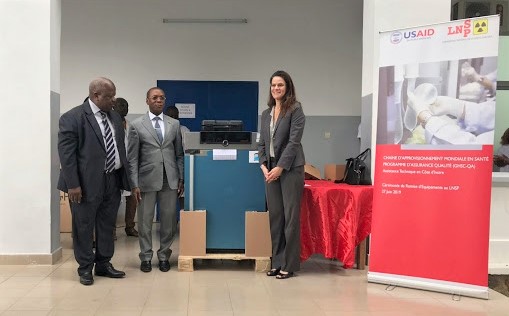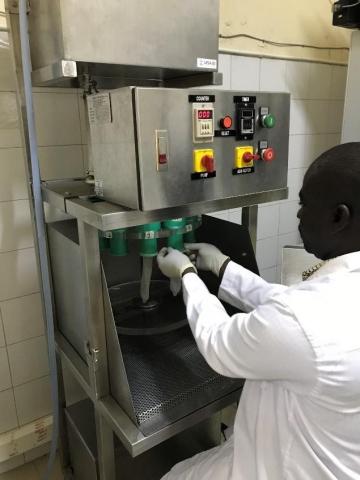With investment from the USAID Mission in Côte d’Ivoire, over the past four years FHI 360 worked closely with LNSP to improve its technical capacity to effectively safeguard public health in the country. Purchasing and installing new testing equipment was a crucial component of this assistance. LNSP now has all the equipment to perform the quality assurance tests required by the International Organization for Standardization (ISO). To celebrate this milestone, a symbolic ribbon-cutting ceremony at LNSP was held on June 27, 2019. Attendees included the General Inspectorate of Health, representing the Minister of Health and Public Hygiene; Dr. Nancy Lowenthal, Country Representative for USAID; and representatives from local organizations. “This assistance allowed us to increase the capacity of our national laboratory by providing it with tools to better meet the testing needs in Côte d’Ivoire,” said Professor Anglade, General Director of LNSP. The ceremony also highlighted LNSP’s commitment to public health and the government’s efforts to meet the health needs of the people of Côte d’Ivoire.

FHI 360, serving as the prime contractor for the USAID Global Health Supply Chain-Quality Assurance Program (GHSC-QA), first visited Côte d’Ivoire’s National Public Health Laboratory (LNSP) in 2016. Much of the equipment required for quality testing was broken, creating barriers to monitoring product quality. As the reference laboratory for the Ministry of Health and Public Hygiene (MSPH), LNSP is responsible for monitoring the quality of health products, such as male condoms and antiretroviral HIV medication, in the local market. However, inadequate equipment limited its ability to meet testing demand and to comprehensively and reliably assure the safety and effectiveness of essential commodities

USAID’s assistance through GHSC-QA has also included hands-on and classroom laboratory trainings, interlaboratory proficiency testing, and support to the National Public Health Pharmacy (NPSP-CI). As a result, LNSP has an improved infrastructure, state-of-the-art laboratory equipment, and stronger technical expertise. These sustainable improvements to its capacity to test product quality enable a more resilient and self-reliant local health system, and thus better health for Ivorian people.